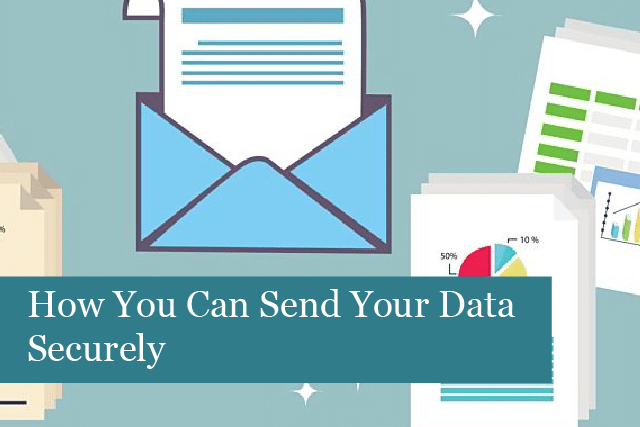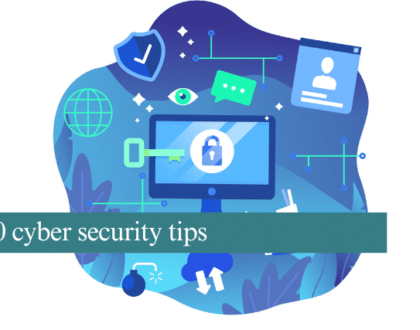
Every day we send, as well as receive, large amounts of data from our family, friends, clients, etc. We try to be careful, but sometimes forget and send sensitive data via email. Yes, it’s more convenient to send sensitive information via email, but don’t allow the convenience to let you forget it’s necessary to keep your data secure at all times.
Sensitive information we send via email can include:
- Credit card information (including the security number on the back of our card)
- IT security information
- Personal health information
- Loan, mortgage, job application or even bank account information
- Proprietary business information
It’s so fast and easy to put that sensitive data into an email and send it off. Whether you’re on your smartphone or laptop, email is still a convenient way to send information. However, it’s not a secure method to share sensitive information with others.
Emails can go to the wrong email address due to a typo, or web criminals can intercept emails and retrieve personal information, etc. It’s just not safe.
Before sending important information via email, stop and ask yourself this question. Would you put the same information on a postcard, that anyone could read, then send it through the post office? Or would you put the information into a sealed envelope and send it via certified mail, which would requite the recipient’s signature? If you’re like most people, you’d choose the second option in order to keep the information secure.
This is the same way you should treat sensitive data when sending it via email. When you send information via email, it’s usually sent via plain text. Anyone can read it if they happen to intercept the message. In fact, there are criminals who use this form of cyberattack, which is called “man in the middle” attack.
How to Stay Safe When Emailing Sensitive Information?
One way to keep your information secure is to use encryption. Going back to our sealed envelope example, using encryption is like sending sensitive information which is sealed, and locked securely to keep others out.
Encryption encodes the information, adding another layer of security to keep sensitive data safe. If a hacker or other criminal happens to intercept the email, they’re unable to read the data because encryption scrambles the message to anyone not authorized to read it. Only the real recipient, who has the correct decryption key, will be able to access the information in the message.
In addition, the recipient will rest assured that the message came from the right person, as encryption adds this layer of assurance and confirmation that the email is from a trusted source.
Businesses can add another layer of security by using Secure File Transfer Protocol (SFTP) for sending and receiving large numbers of files or big files. SFTP encrypts the files in transit, making them unreadable to anyone who doesn’t have the decryption key.
It’s a good idea to urge staff to use these methods to keep company data secure:
- Encrypt files before sending to the cloud
- Only use encrypted email services (Gmail & Outlook, for instance)
- Avoid opening business emails on unsecured WiFi networks (such as those found in coffee shops, airports, etc.)
- Use drive encryption on all portable devices, including smartphones, laptops, etc.
- Control data access: it’s possible to set roles and security levels for people who must view sensitive data. For instance, access can be set to grant permissions, including who can (or cannot) view, edit and send files with important data to others.
Business Encryption Tools
Here are some business encryption tools to keep your data safe:
pCloud Crypto: this is a secure cloud storage service, which adds a layer of encryption to keep stored files secure. There’s no limit on file size (that we could find), so it’s great for syncing large files and sharing them.
There’s a base charge of $5/month for 500GB for cloud services, if paid annually. It’s another $5/month to add client-side encryption to protect files.
This service offers support for Linux, iOS, Windows and macOS, and they offer a web platform, to.
Signal: many consider this the gold-standard when it comes to encrypted messages. The service is open source, and anyone can inspect it. While this doesn’t make it easier to hack, it does mean there are many people looking at the service’s encryption methods.
The app offers industry-leading encryptions, while being easy to use. It also supports group chats, along with sending files, photos, text, etc. This app has you covered.
This app works with Android devices and is free; you can find it in Google’s Play Store.
SendSafely: is another service that’s easy to use and offers the highest levels of security for your sensitive business data. Features include access tracking & notification, so you can see who’s viewed the data and when they accessed the information. You’ll even be able to see their geographic location. The service also notifies you when secure items have been viewed, so you’re not left wondering if they’ve received the information or not. You can also revoke access to sent items at any point in time, or add new recipients as needed.
SendSafely also provides SMS verification and two-step login. Users are authenticated before they can access the data. The service also allows you to receive items securely from anyone, even if they don’t have a SendSafely account. You can also configure expiration of access.
SendSafely offers a wide variety of pricing options—one’s sure to fit your budget.
LastPass: is a service that allows you to save and manage passwords securely. It works across numerous platforms including web browsers, iOS, Android and Windows devices.
LastPass uses strong encryption algorithms, using AES-256 bit encryption with PBKDF2 SHA-256 and salted hashes to ensure complete security. You can access passwords across devices and browsers, so you can always count on access.
The LastPass vault is where you can save passwords, secure notes, credit card information and more. If you’d like to share a password, it’s easy to add a user and allow them to only access the information they need and nothing more. Everything else in your vault stays completely secure and inaccessible.
LastPass offers services for personal and business use and offers various pricing plans for both personal and business accounts.
As you can see, there are various methods you can use to keep personal and business information safe and secure. Just choose the service(s) that best work for your situation. They’re easy to use and fast to set up. Once you have them up and running, you’ll be able to share all kinds of sensitive data only with the people who need it.
Recommended Posts

IT Simplified: What Is A Firewall?
21st March 2025

10 cyber security tips
14th March 2025

